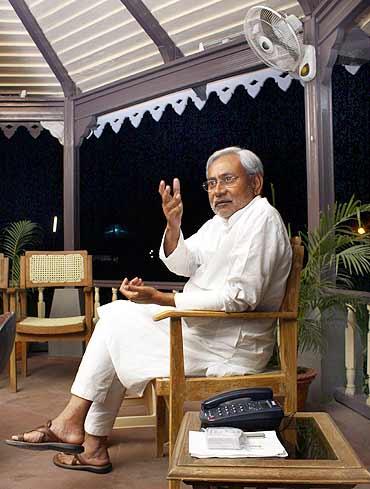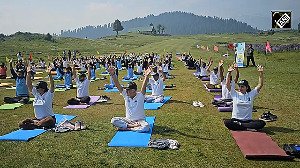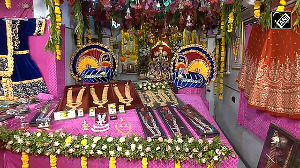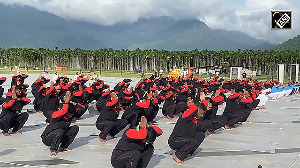 The Bharatiya Janata Party's quest to strengthen its base in north India starts from Bihar, says Bharat Bhushan.
The Bharatiya Janata Party's quest to strengthen its base in north India starts from Bihar, says Bharat Bhushan.
After forming a government with a comfortable majority at the Centre, the next priority of the Bharatiya Janata Party will be to consolidate its support base in north India. The BJP's political focus in the coming months will be Uttar Pradesh and Bihar. In UP, the party won an unexpected 71 and in Bihar, 22 Lok Sabha seats. If one takes into account the BJP's allies, then the tally goes up to a stupendous 73 out of 80 in UP and 31 out of 40 in Bihar.
Both have non-BJP governments. If the BJP can marginalise the non-BJP opposition and capture their support base, it can then look forward to enjoying power at the Centre for a decade or more. Although moves seem afoot to somehow dismiss the Akhilesh Yadav government in Uttar Pradesh and impose President's rule or split the existing parties (according to the party's dirty tricks apparatchik, Amit Shah, 242 of the 402 MLAs in UP assembly were members of the BJP at one point or the other), the process is likely to begin from Patna. Once the Nandas, Mauryas, Sungas and the Guptas ruled from here, and now the BJP will try its luck.
The contours of the coming battle for Bihar will become clear after the by-election for the two Rajya Sabha seats. If the candidates of the Janata Dal-United win, then the current Bihar government may survive till next year. Otherwise, the state stares at an early election within months.
What makes Bihar suddenly vulnerable is the by-election for the remaining term of two Rajya Sabha seats vacated by the election of Rajiv Pratap Rudy and Ramkripal Yadav to the Lok Sabha. The candidates of the JD-U are Pavan Verma -- a former diplomat and close advisor to Nitish Kumar and Ghulam Rasool Balyawi, a Muslim cleric. Given 11 vacancies in the House, they need a simple majority of 117 votes each in the legislative assembly -- which is the legislative strength of the JD-U -- to win. It also has the support of the four Congress legislators, one from the Communist Party of India and two independents. That is a total of 124 legislators.
Under normal circumstances, this would be a comfortable margin since the BJP has only 84 MLAs and the support of three independents. But the presence of about 25 to 30 rebel MLAs in the ranks of the JD-U complicates matters. The Election Commission has issued a directive that party whips cannot be issued to force the legislators' choice. Were the 30 rebels to join hands with the 87 led by the BJP, they could defeat the official candidates of the JD-U.
Predictably, the rebels have decided to support two independents -- Anil Kumar Sharma, a real estate moneybag and a defeated JD-U Lok Sabha candidate from Jehanabad, and Sabir Ali, a JD-U Rajya Sabha MP from 2008 to 2014. He was expelled from the party by Nitish Kumar for praising Narendra Modi on the eve of the Lok Sabha elections. He joined the BJP briefly, before his membership was terminated because of criticism by several party leaders.
If the official JD-U candidates are defeated, the BJP can claim that the incumbent government has lost its majority, has no right to continue in power and demand fresh elections.
As an early election is likely to be swept by the BJP, Kumar has been pleading with former political adversary Lalu Prasad Yadav of the Rashtriya Janata Dal for the votes of his 21 MLAs. Yadav came to the rescue of the Jitan Manjhi-led JD-U government on a vote of confidence but seems unsure whether he should continue with his support, although he, too, is afraid of the electoral outcome of an early assembly election.
Deciding to support the JD-U's official candidates for the Upper House has not been easy for Yadav because several party leaders are critical of him for supporting it on the trust vote, given that Kumar had encouraged defections from the party. Kumar also did not consult Yadav before selecting his Rajya Sabha candidates. Yadav might well have wanted his wife, Rabri Devi, as a joint candidate for Rajya Sabha. It would have helped him maintain the family's token presence in national politics as well as retain a government bungalow in Delhi.
Voting with the JD-U in the Rajya Sabha election could also possibly further weaken Yadav's position in his party. His party MLAs might decide to cross-vote, or even worse, the two independent candidates might win despite his support. However, in the long run, he will have no option but to support the JD-U to prevent an early election. The BJP is likely to take a last-minute decision on whether to cast its vote along with the rebel group within the JD-U, waiting to see if it has consolidated sufficiently.
Apart from tactical moves to force an early election, the BJP has also forged forward strategically in Bihar. The alliance of the Upper Castes and the non-Yadav Other Backward Classes, which was represented by the BJP-JD-U coalition for nearly eight years between November 2005 and June 2013, is sought to be replicated by the BJP. Within the BJP, the alliance is being forged by reposing faith in the OBC leadership of Sushil Kumar Modi in the state unit of the party and, additionally, by the party entering into an alliance with the Dalits through Ram Vilas Paswan's Lok Janshakti Party and the non-Yadav, non-Kurmi OBCs represented by ally, Upendra Kushwaha's Koeri-dominated Rashtriya Lok Samata Party.
If this realignment of castes is sustained, then the BJP will have the advantage in an early assembly election if there is a three-cornered contest, helped along by the residual momentum of Modi's victory at the Centre.
However, if Yadav's support to the JD-U saves the day for Kumar -- it is not certain that it will -- that could lay the foundation for a new alliance between the JD-U, Congress and the RJD. The long-term political survival of Yadav's and Kumar's politics lies in making the Bihar polity bipolar. Only then can the BJP be given a tough contest in the ensuing assembly election, while protecting the non-BJP political space.
Image: Bihar Chief Minister Nitish Kumar. Photograph: Reuters.










